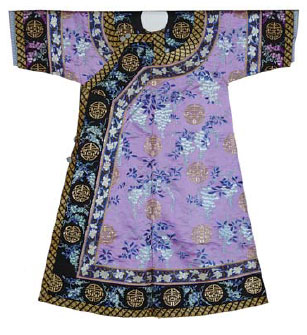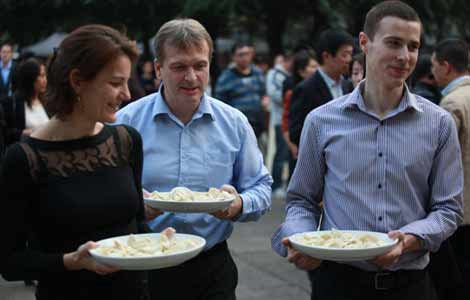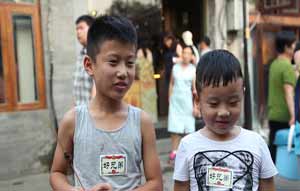Rare chance to see timeless style
Updated: 2013-06-06 08:10
By Zhao Ruixue (China Daily)
|
||||||||

An exhibition at the Shandong Provincial Museum is displaying a large selection from the Ming (1368-1644) and Qing (1644-1911) dynasties' wardrobes. The exhibition, which presents about 200 garments in Shandong's provincial capital Jinan, features clothes worn by emperors, nobles and ordinary people.
The collection comes from the Palace Museum, Shandong Provincial Museum and Qufu Cultural Relics Management Committee.
"This is probably the last such exhibition for decades because of concerns about preserving such priceless relics," says Fang Hongjun, a traditional clothing expert with the Palace Museum in Beijing.
The Ming clothing is representative of the ethnic Han's ancient style, which is loose and elaborate. The Qing clothing is of traditional ethnic Manchu tailoring, which is tight-fitting with narrow sleeves.
Shandong Cultural Relics Bureau chief Xie Zhixiu explains: "These two crucial clothing systems differ but share common threads that demonstrate the story of cultural integration."
The exhibition has devoted its first display area to the crown and clothes of Zhu Tan (1370-89), the son of the Ming Dynasty's founder Zhu Yuanzhang. The nine-tasseled crown is the only one of its kind in the world, Shandong Museum deputy director Wang Zhihou says.
Other attire belonging to Zhu Tan includes a rattan crown stitched with nine strings, each string with nine jade beads and a yellow-brocade satin robe with four golden-threaded dragon roundels. His jade accessories are also on show. These items were unearthed from his tomb in Shandong's Zoucheng city in 1971.
The second display area shows Ming clothing from the collection of the Kong Family Mansion, the home of Confucius and his descendants. It shows the attire of Ming nobility for court, ceremony and daily life.
The exhibition of Qing clothing shows the introduction of Manchu influence on Han styles. About 60 items were selected from the Palace Museum, including empresses' fox-fur overcoats, court robes and skirts, and nobles' travel jackets, shawls and shoes.
"These garments' designs not only decode the Qing hierarchy but also offer inspiration for modern costume designs," Fang says.
The exhibition will end on June 18.

 Victoria Beckham S/S 2014 presented during NYFW
Victoria Beckham S/S 2014 presented during NYFW
 'Despicable' minions upset Depp's 'Lone Ranger' at box office
'Despicable' minions upset Depp's 'Lone Ranger' at box office
 'Taken 2' grabs movie box office crown
'Taken 2' grabs movie box office crown
 Rihanna's 'Diamonds' tops UK pop chart
Rihanna's 'Diamonds' tops UK pop chart
 Fans get look at vintage Rolling Stones
Fans get look at vintage Rolling Stones
 Celebrities attend Power of Women event
Celebrities attend Power of Women event
 Ang Lee breaks 'every rule' to make unlikely new Life of Pi film
Ang Lee breaks 'every rule' to make unlikely new Life of Pi film
 Rihanna almost thrown out of nightclub
Rihanna almost thrown out of nightclub
Most Viewed
Editor's Picks

|

|

|

|

|

|
Today's Top News
Going green can make good money sense
Senate leader 'confident' fiscal crisis can be averted
China's Sept CPI rose 3.1%
No new findings over Arafat's death: official
Detained US citizen dies in Egypt
Investment week kicks off in Dallas
Chinese firm joins UK airport enterprise
Trending news across China
US Weekly

|

|








